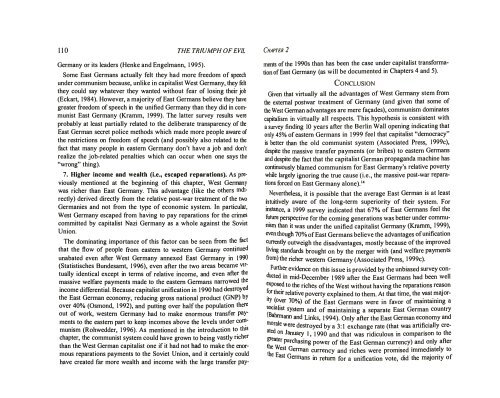austin-murphy-the-triumph-of-evil
austin-murphy-the-triumph-of-evil
austin-murphy-the-triumph-of-evil
You also want an ePaper? Increase the reach of your titles
YUMPU automatically turns print PDFs into web optimized ePapers that Google loves.
110 THE TRIUMPH OF EVIL<br />
Germany or its leaders (Henke and Engelmann, 1995).<br />
Some East Germans actually felt <strong>the</strong>y had more freedom <strong>of</strong> speech<br />
under communism because, unlike in capitalist West Germany, <strong>the</strong>y felt<br />
<strong>the</strong>y could say whatever <strong>the</strong>y wanted without fear <strong>of</strong> losing <strong>the</strong>ir job<br />
(Eckart, 1984). However, a majority <strong>of</strong> East Germans believe <strong>the</strong>y have<br />
greater freedom <strong>of</strong> speech in <strong>the</strong> unified Germany than <strong>the</strong>y did in com·<br />
munist East Germany (Kramm, 1999). The latter survey results were<br />
probably at least partially related to <strong>the</strong> deliberate transparency <strong>of</strong> <strong>the</strong><br />
East German secret police methods which made more people aware <strong>of</strong><br />
<strong>the</strong> restrictions on freedom <strong>of</strong> speech (and possibly also related to <strong>the</strong><br />
fact that many people in eastern Germany don't have a job and don't<br />
realize <strong>the</strong> job-related penalties which can occur when one says <strong>the</strong><br />
"wrong" thing).<br />
7. Higher Income and wealth (i.e., escaped reparations). As pre·<br />
viously mentioned at <strong>the</strong> beginning <strong>of</strong> this chapter, West Gem_tan�<br />
was richer than East Germany. This advantage (like <strong>the</strong> o<strong>the</strong>rs mdJ·<br />
rectly) derived directly from <strong>the</strong> relative post-war treatment <strong>of</strong> <strong>the</strong> two<br />
Germanies and not from <strong>the</strong> type <strong>of</strong> economic system. In particular,<br />
West Germany escaped from having to pay reparations for <strong>the</strong> crim . es<br />
committed by capitalist Nazi Germany as a whole against <strong>the</strong> Sov1et<br />
Union.<br />
The dominating importance <strong>of</strong> this factor can be seen from <strong>the</strong> fact<br />
that <strong>the</strong> flow <strong>of</strong> people from eastern to western Germany continued<br />
unabated even after West Germany annexed East Germany in 1 �<br />
(Statistisches Bundesamt, 19%), even after <strong>the</strong> two areas became vu·<br />
tually identical except in terms <strong>of</strong> relative income, and even after <strong>the</strong><br />
massive welfare payments made to <strong>the</strong> eastern Germans narrowed <strong>the</strong><br />
income differential. Because capitalist unification in 1990 had destroy ed<br />
<strong>the</strong> East German economy, reducing gross national product (GNP) by<br />
over 40% (Osmond, 1992), and putting over half <strong>the</strong> population <strong>the</strong>re<br />
out <strong>of</strong> work, western Germany had to make enormous transfer pay<br />
ments to <strong>the</strong> eastern part to keep incomes above <strong>the</strong> levels under co�munism<br />
(Rohwedder, 1996). As mentioned in <strong>the</strong> introduction to thiS<br />
chapter, <strong>the</strong> communist system could have grown to being vastly richer<br />
than <strong>the</strong> West German capitalist one if it had not had to make <strong>the</strong> enormous<br />
reparations payments to <strong>the</strong> Soviet Union, and it certainly could<br />
have created far more wealth and income with <strong>the</strong> large transfer pay-<br />
CHAPTER 2<br />
ments <strong>of</strong> <strong>the</strong> 1990s than has been <strong>the</strong> case under capitalist transforma<br />
tion <strong>of</strong> East Germany (as will be documented in Chapters 4 and 5).<br />
CoNCLUSION<br />
Given that virtually all <strong>the</strong> advantages <strong>of</strong> West Germany stem from<br />
<strong>the</strong> external postwar treatment <strong>of</strong> Germany (and given that some <strong>of</strong><br />
<strong>the</strong> West German advantages are mere fa�ades ), communism dominates<br />
capitalism in virtually all respects. This hypo<strong>the</strong>sis . is c�n�iste . nt with<br />
a survey finding 10 years after <strong>the</strong> Berlin Wall opemng mdtcatmg that<br />
only 45% <strong>of</strong> eastern Germans in 1999 feel that capitalist "democracy"<br />
is better than <strong>the</strong> old communist system (Associated Press, 1999c),<br />
despite <strong>the</strong> massive transfer payments (or bribes) to eastern Germans<br />
and despite <strong>the</strong> fact that <strong>the</strong> capitalist German propaganda machine has<br />
continuously blamed communism for East Germany's relative poverty<br />
while largely ignoring <strong>the</strong> true cause (i.e., <strong>the</strong> massive post-war repara<br />
tions forced on East Germany alone). 14<br />
Never<strong>the</strong>less, it is possible that <strong>the</strong> average East German is at least<br />
intuitively aware <strong>of</strong> <strong>the</strong> long-term superiority <strong>of</strong> <strong>the</strong>ir system. For<br />
instance, a 1999 survey indicated that 67% <strong>of</strong> East Germans feel <strong>the</strong><br />
future perspective for <strong>the</strong> corning generations was better under commu<br />
nism than it was under <strong>the</strong> unified capitalist Germany (Kramm, 1999),<br />
even though 70% <strong>of</strong> East Germans believe <strong>the</strong> advantages <strong>of</strong> unification<br />
currently outweigh <strong>the</strong> disadvantages, mostly because <strong>of</strong> <strong>the</strong> improved<br />
living standards brought on by <strong>the</strong> merger with (and welfare payments<br />
from) <strong>the</strong> richer western Germany (Associated Press, 1999c).<br />
Fur<strong>the</strong>r evidence on this issue is provided by <strong>the</strong> unbiased survey con<br />
ducted in mid-December 1989 after <strong>the</strong> East Germans had been well<br />
exposed to <strong>the</strong> riches <strong>of</strong> <strong>the</strong> West without having <strong>the</strong> reparations reason<br />
�or <strong>the</strong>ir relative poverty explained to <strong>the</strong>m. At that time, <strong>the</strong> �ast . �ajor<br />
lty (over 70%) <strong>of</strong> <strong>the</strong> East Germans were in favor <strong>of</strong> mamtammg a<br />
socialist system and <strong>of</strong> m aintaining a separate East German country<br />
(Bahrmann and Links, 1994). Only after <strong>the</strong> East German economy and<br />
morale were destroyed by a 3: 1 exchange rate (that was artificially cre<br />
ated on January I, 1990 and that was ridiculous in comparison to <strong>the</strong><br />
&rester purchasing power <strong>of</strong> <strong>the</strong> East German currency) and only after<br />
<strong>the</strong> West German currency and riches were promised immed�at�ly to<br />
<strong>the</strong> East Germans in return for a unification vote, did <strong>the</strong> maJonty <strong>of</strong>


